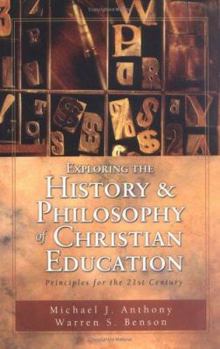Exploring the History and Philosophy of Christian Education: Principles for the Twenty-First Century
An insightful look at the relationship between history and philosophy and how they impact Christian education from the Old Testament to the present. This volume begins with Old Testament history and moves forward to the present, showing the history and philosophy of Christian education in each era. It does so against the backdrop of wider philosophical thought and historical events and shows how they shaped Christian education. Not only do the authors...
Format:Paperback
Language:English
ISBN:0825420237
ISBN13:9780825420238
Release Date:November 2003
Publisher:Kregel Academic & Professional
Length:443 Pages
Weight:1.20 lbs.
Dimensions:0.9" x 6.6" x 8.6"
Customer Reviews
3 ratings
fine
Published by Thriftbooks.com User , 14 years ago
Everything was fine. There are stickers on it I did not expect, but no big deal.
A Helpful Tool
Published by Thriftbooks.com User , 18 years ago
The authors strive to make this book a very practical tool. They look upon the past to gather valuable insights to better equip the future servant. Having learned valuable lessons from those who have gone before them, the readers will be better prepared to meet the challenges that lay ahead. Each chapter has three major emphases that are very helpful: 1.Historical context- Each chapter is introduced with a section titled "What in the World?" to introduce the reader to what else was happening in the world in the era being reviewed, beyond the scope of the particular chapter. 2.Frequent Summaries- The authors make frequent use of text boxes to provide a summary of the material being discussed. This is a very useful tool to refer back to in the future. 3.Contemporary relevance- Each chapter concludes with a section labeled "So What? Lessons from the past for 21st Century Christian Education" These sections draw out principles or lessons derived from the particular historical era. In the final chapter the authors encourage the reader to develop a Personal Philosophy of Ministry divided up into seven categories and to support their view with scripture. The categories include the Role and Nature of the Teacher, Role and Nature of the Learner, Pupose and Goals of the Lesson, and Outcomes Assessment. This will help the servant to apply theory to practice. The book ends with an Epilogue, which attempts to pull together the lessons learned from this study. It is broken down in seven summarizing points. It has an 8-page textbox titled "So What? Cumulative Lessons from the Past for 21st Century Education" which contains seven points. Among those summarizing points are that Ministry leaders should lead the way in demonstrating servant leadership (point 2), God's Word is preeminent (point3), and that change is necessary (point 7). I definitely recommend the book as it is a very helpful tool in looking at the history and philosophy of Christian Education. As the authors state "The emphasis of this history book is the future." We will be able to learn from the lessons of the past and apply it to our future ministry.
Not the perfect one
Published by Thriftbooks.com User , 19 years ago
It is always gratifying to see attention paid to the perennial ideas and ideals, the importance of understanding the events and lessons of history, and to the appreciation of the classics in any educational enterprise. Perhaps more so today, it is cause to celebrate when that attention happens in the context of theological education. An informal survey of courses of study in theological schools will reveal a diminishing opportunity for being introduced in any systematic way to the history and philosophy of educational thought and Christian education. So it was with some anticipation that this reviewer read Anthony and Benson's volume on the history and philosophy of Christian education. While the organization and coverage of the text offers a traditional Western approach that is recognizable to those who appreciate "old school," sadly, it has little to contribute by way of new insight, interpretation, or challenge to the contemporary reader. The coverage of history and philosophies which impact Christian education extends up to the twentieth century, but ends with a cursory treatment of the very influential impact of existentialism, and almost no treatment of substance of postmodernism, a school of thought that, regardless of what extent one sees as relevant, should nevertheless be dealt with critically by any student of history, philosophy, and education. This is at best an introductory college-level textbook. The coverage and treatment of the subject at hand is much too simplistic, at times understated to the point of inaccuracy, to allow for deep understanding of the subject. For example, the extent of the reference to the Odyssey is the statement that it is "the account of Odysseus, the king of Ithaca, who makes an arduous journey home from the battlefield" (p. 47). There are too many oversimplifications like, "People worshiped Greek gods more out of fear for how the gods could hurt them than out of a genuine desire to express their appreciation and affection for the gods. They presented offerings more to avoid future punishment than to express heartfelt thanksgiving" (p. 48). The book also suffers from an over reliance on educational, theological, and philosophical dictionaries and general works as well as some puzzling sources like the All Color Book of Greek Mythology (Pattrick, London: Octopus, 1972). The authors provide what they call "three major emphases" throughout the book. The first is the placing of the historical content under examination into a broader context through the use of a timeline list under the caption "What in the world?" This is a sidebar feature that is somewhat helpful. The second is the use of textboxes (sidebars) that provide an (overly) interpretive summary of the material under discussion. The third feature is a final chapter section labeled "So What?" in which the authors summarize and attempt to apply "principles or lessons" (hence the subtitle) from the material-a sort of whack on the side of the he






